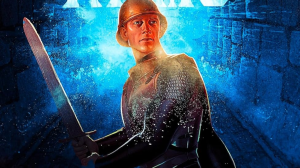Star Trek: Picard wrapped its first season on CBS All Access this week. The series, following in the footsteps of Star Trek: Discovery, brought serialized storytelling to the Star Trek universe, this time to the post-Star Trek: Nemesis era of the canon. That’s on the other end of the spectrum of Patrick Stewart’s adventure as Captain Jean-Luc Picard in Star Trek: The Next Generation. The shift in storytelling style is significant for a franchise with a more than 50-year history. Showrunner Michael Chabon headed up this first season of Star Trek: Picard. Ahead of the finale, he spoke to Variety and discussed the challenge of week-to-week serialized television.
Videos by ComicBook.com
“You know, if you’re watching a one hour episode of [pre-2010s] Star Trek, all of them — except for long swaths of Deep Space Nine toward the end of its run — have been episodic,” Chabon says. “It could be a character having [makes air-quotes] ‘dark issues.’ You could even introduce a certain ‘dystopian’ element into an episode of Star Trek. You could introduce that in Act One, and any fan would be willing to tolerate that. They would be willing to tolerate a character having a substance abuse problem or not being nice to their fellow crew members — as long as it got put back to rights at the end of the episode.
“When you do it in episode 1 or 2 of a 10-episode season, and that character’s problem doesn’t really get resolved until the last couple episodes — a lot of people can’t tolerate that. And that’s really interesting. Again, it’s a question of expectations, of biases. You come to Star Trek, I think, as a fan, especially if you’ve watched all the episodes many, many times, with this expectation that you won’t have to tolerate that kind of level of ‘darkness’ for that long. And so that when a show in this era asks you to do what you are readily willing to do with a show like Westworld or Breaking Bad or whatever — somehow, the mere fact that it’s Star Trek makes it hard to accept.
“And I actually get that. It’s a little weird for me, too. Both in conceiving this show, and sometimes, if I can give myself enough distance as I’m watching the episodes as they’re dropping, I can feel this deep wiring in my brain that wants Star Trek to be episodic. I can remember how odd it felt watching those serialized episodes of Deep Space Nine. I wasn’t entirely sure I liked it then, either. It was so far ahead of its time. I appreciated it because they were dealing with a very greatly disturbed moment in the history of the Federation with the Dominion war. It felt appropriate, I respected it, and I understood it — and it made me uncomfortable as a Star Trek fan.
“So it’s been interesting for me, to get back to your original question, watching the response unfold in real time and being able to understand where a lot of this is coming from as a fan. It’s made it easier for me to accept when fans express their displeasure. But it’s human nature to focus on that stuff, and to kind of ignore the fact that the vast majority of fan response seems to be really positive. And, you know, I’ve also been gratified to see a lot of people who do like the show taking other people to task so that I don’t have to.”
Star Trek: Picard will return for its second season on CBS All Access.








